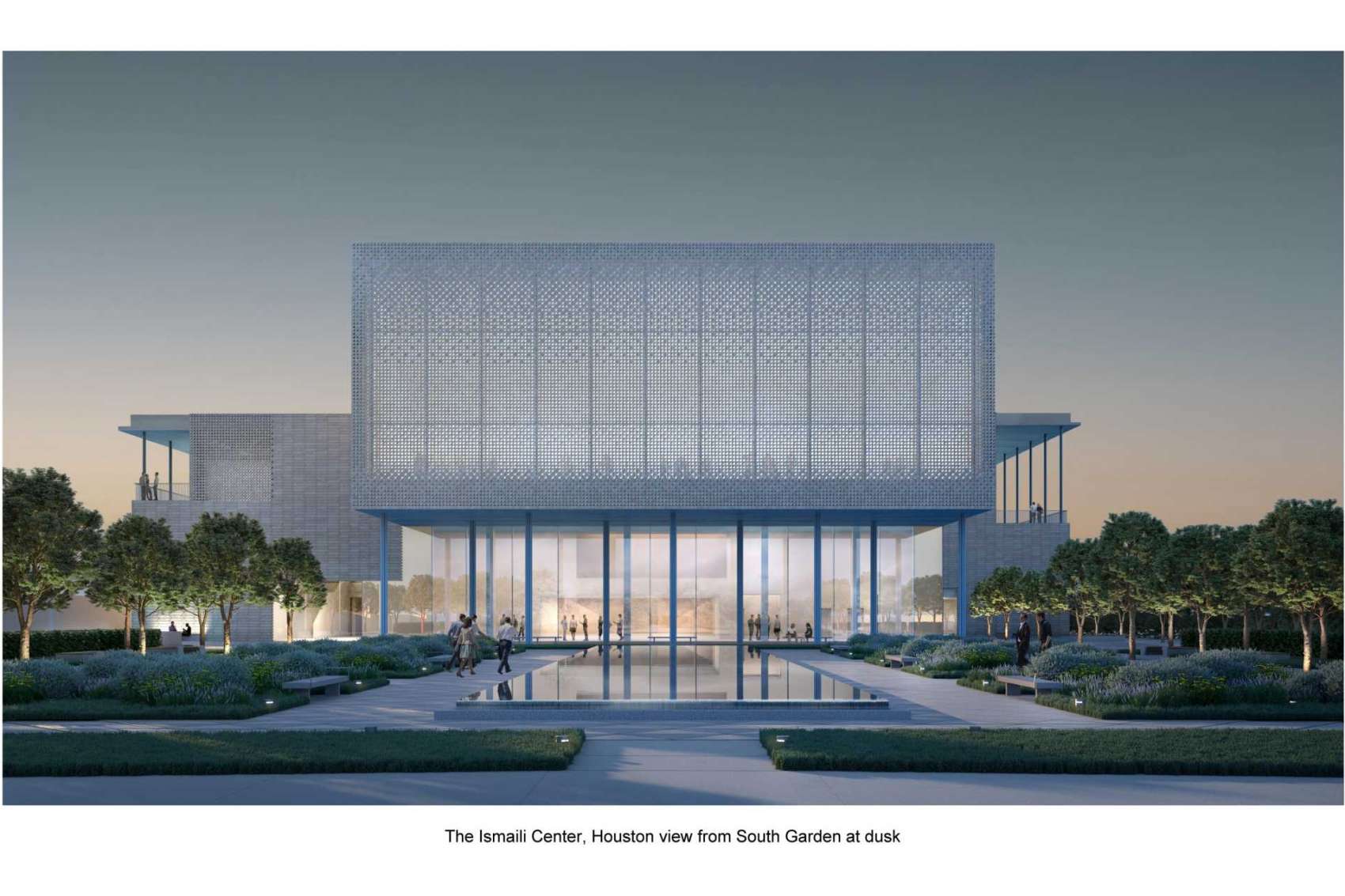Designs for Houston’s the Ismaili Center Houston were unveiled Monday afternoon, revealing architecture and gardens likely to set a new bar in a city increasingly devoted to modern design and lush green spaces.
With a structure designed by UK-based Farshid Moussavi and gardens by Thomas Woltz of Nelson Byrd Woltz Landscape Architects — a renowned landscape architect known locally for his work transforming Memorial Park — the new Ismaili Center will sprawl across 11 acres at the southeast corner of Allen Parkway and Montrose Boulevard.
Clad in a silvery beige Turkish marble, the building will be a cultural landmark where local and visiting Ismailis can worship, and where others can attend cultural and educational events. Gardens on all four sides will include terraced plantings and water features in a configuration that pays homage to ancient Islamic architecture but with vegetation found in Texas ecosystems.
Houston was chosen several years ago by His Highness Aga Khan as the site of America’s first Ismaili Center, picked for its large population of Ismaili Muslims and for its overall diverse community. The Aga Khan is the spiritual leader — or imam — of Ismaili Muslims, and is a direct descendant of the Prophet Muhammad, who founded Islam some 1,400 years ago.
The Aga Khan Foundation purchased the local land in 2006 and later donated seven monumental artworks — Jaume Plensa’s “Tolerance” sculptures — that sit across the street in Buffalo Bayou Park. Excavation on the site is already under way and a formal ground breaking will likely take place early next year with construction finished by the end of 2024.
[…]
The Ismaili Center has no front or back; each side is equally detailed and welcoming, though there will be entry doors off of West Dallas and Montrose streets, Moussavi said. Deep on the lot toward West Dallas, the building had to be located outside of the 500-year flood plain to avoid damage in future weather events.
Woltz, who leads the landscape architecture team that will craft 10 acres of lush garden where there is now dirt and scruffy weeds, also did the landscaping for the Ismaili Center in London. Houston’s center will be the seventh throughout the world; the others — built between 1985 and 2014 — are in London, Toronto, Lisbon, Dubai, and in Burnaby, British Columbia, and Dushanbe, Tajikistan.
See here for the previous update, and here for an aerial view of what the property will eventually look like. It sounds great and the pictures are amazing. I still don’t know why it all took so long, but at least something is finally being built there. Maybe there will be hope for The Stables some day.


26 days and counting………
I’ve been watching this property for years and wondering what was going to happen with it. There’s been a flurry of work in the past couple of months and I think there has been some major environmental mitigation work that needed to get done before they could build. Maybe that’s been the holdup?
Architectural design looks incredible. I too have wondered for years what would become of that idyllic empty space.
I look forward to running past it on Houston Marathon course in a few years when it is completed.
Hagia Sophia on the Bayou
PROUDLY PROFESSING STRUCTURE-OF-WORSHIP IGNORANCE
We at the local subchapter of the policywonqueria remember the elongated Bayou-adjacent property discussion from Swamplot days. Aga Khan Foundation figured then.
But who are the Ismailis?
Is this structure going to be a new take on the concept of mosque or a Hindu temple, or a synagogue of a select sect descended from Abraham? Equivalent of a cathedral for Sikhs? Or just something unversalistically trans as in transcendental?
Turkish marvel clad in marble?
A veritable mystery for the masses. Where are the quality journalist and home office swivel chair experts to add profundity when you need to them to remedy popular deficiencies in the diversity-in-believership department.
Not to mention lack of architectural acumen in negotiating or at least appreciating the intersectionality of aesthetics and functionality.
Wonk, this artists rendering couldn’t be any further/farther from Hagia Sophia in design (originally built as a basilica close to 1,500 years ago, and rebuilt many times since; now an incredibly impressive domed roof structure), ‘constructors’ (originally Christians), or local topography (intersection of the Black Sea and the Sea of Marmara, overlooking the confluence).
Landscape Architect Wolz’s comments on the proposed gardens have me thinking that they will be a unique public space and every bit as interesting as the architecture.
P Wonk,
Why don’t you just say “what the hell are these muslims doing?” instead of vomiting up the word jive you wrote.
AGNOSTIC ABOUT WORSHIP VENUES
Frederick … Whatever anti-ism you want to find you will no doubt be able to bring forth by ascription or projection. So there. Why don’tcha go in front of a mirror and see what’s in there, looking at you.
The wonq comment was obviously tongue-in-cheek, and it wasn’t about any particular religion, though prepondering toward the monotheistic. If you want to add to the limited selection, and any associated architectural marvels, feel free to do so for the benefit of the discerning OTK readership.
Add atheism, too, if you will. Why not?
Cutting-edge agnostic architecture anyone?
PS: C.L. had something educational to add about about the Hagia Sophia. You could too.
More on the multireligious world heritage item here: https://www.britannica.com/topic/Hagia-Sophia